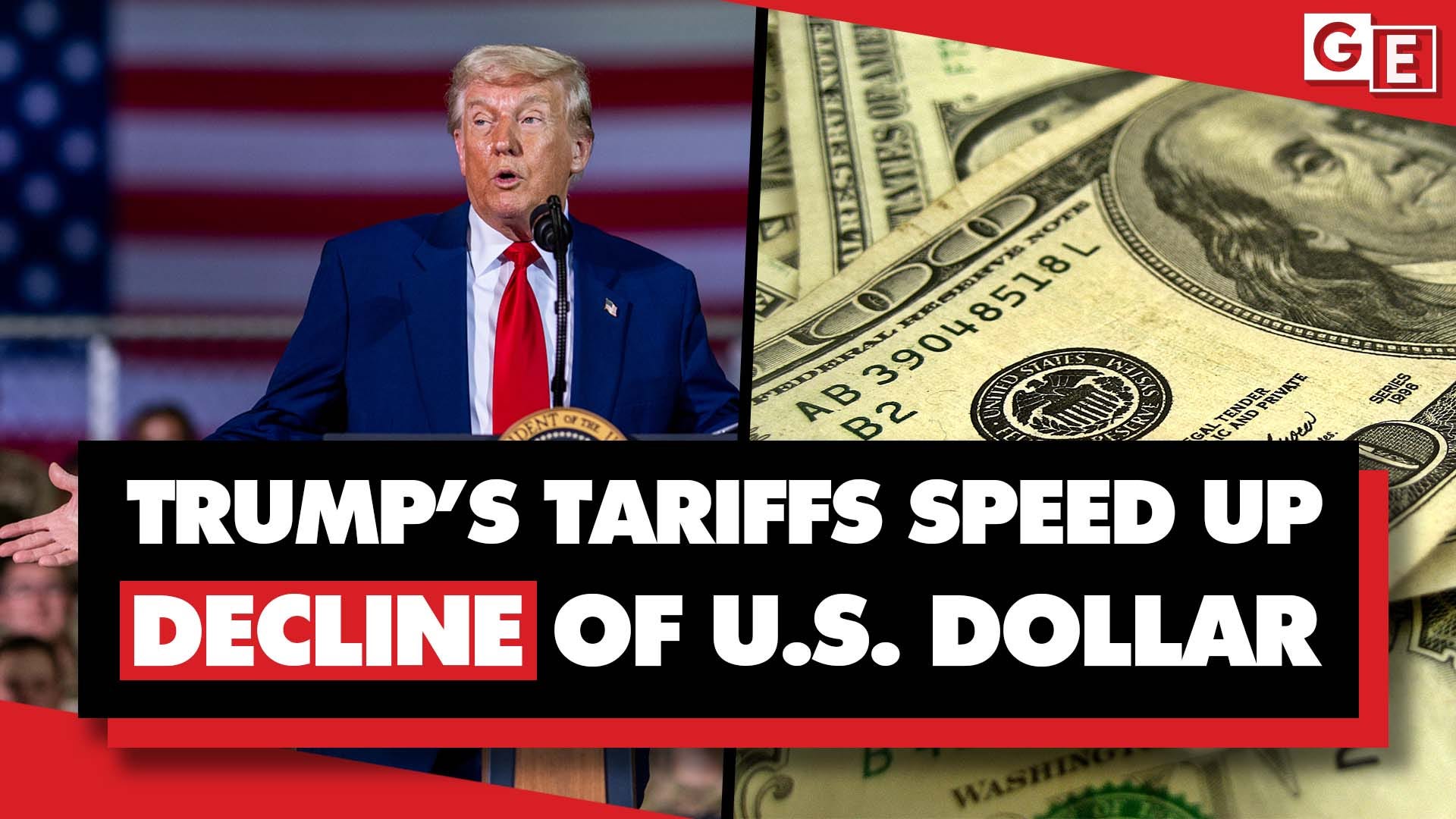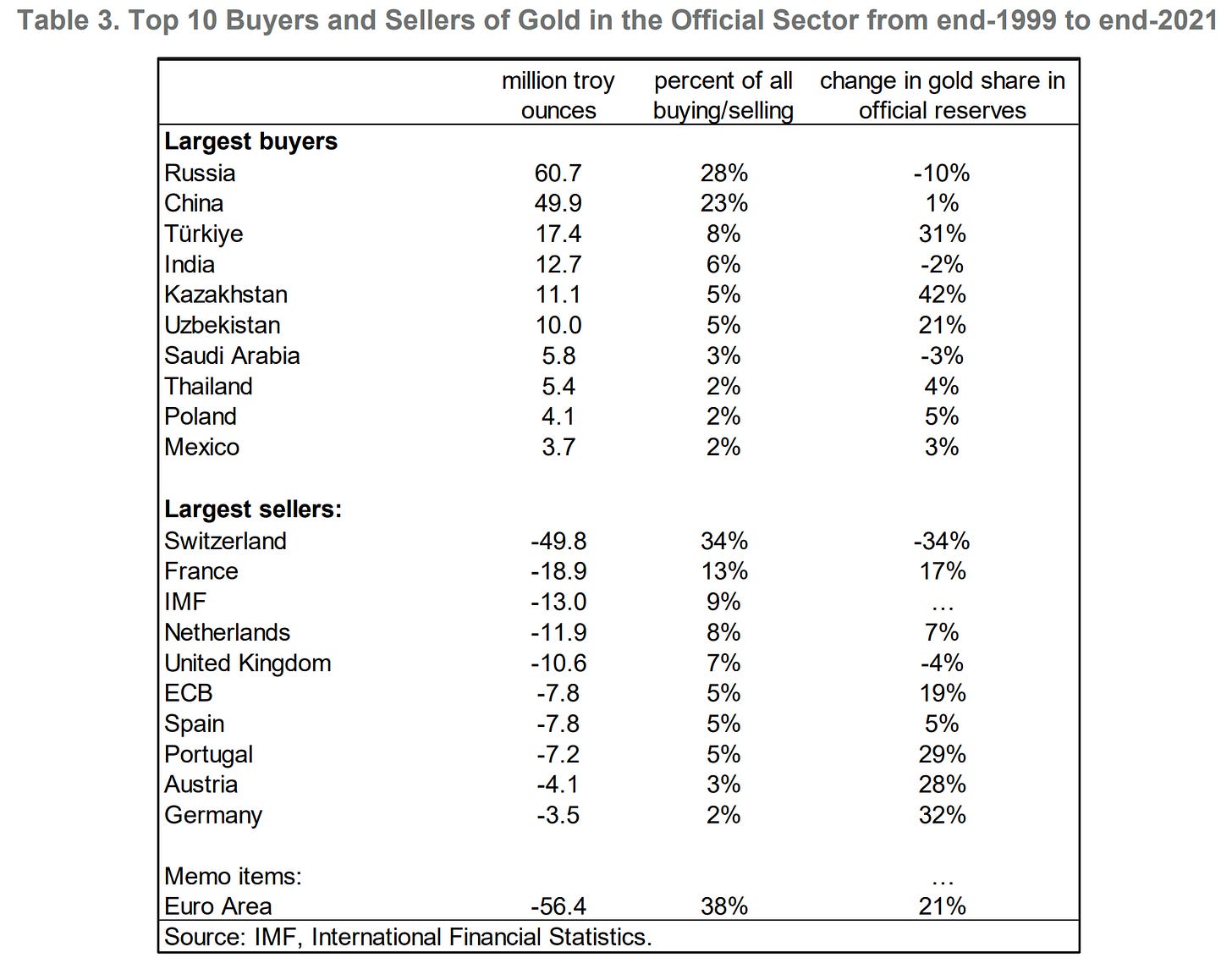Trump's tariffs turbocharge de-dollarization: World sells US dollar assets, seeking alternatives
Donald Trump wants to save the global dominance of the US dollar, but his tariffs and trade war are accelerating dedollarization. Countries and investors are selling off US stocks and bonds.
Donald Trump has made it clear that one of his top goals is to maintain the dominance of the US dollar as the global reserve currency.
When he was running for president in 2024, Trump promised he would punish any country that sought alternatives to the US currency by hitting them with sky-high tariffs.
"Many countries are leaving the dollar. They're not going to leave the dollar with me!", Trump vowed at a campaign rally. "I'll say, 'You leave the dollar, you're not doing business with the United States, because we're going to put 100% tariff on your goods'".
Since Trump has returned for his second term as US president, however, his tariffs and trade war have actually accelerated the decline of the dominance of the US dollar, not slowed it.
Dedollarization grows
Dedollarization was previously associated mostly with Global South countries -- especially those that are members of BRICS, the organization founded by Brazil, Russia, India, China, and South Africa, which has expanded and now represents 42% of global GDP (PPP) and 55% of the world population.
Trump's tariffs, nevertheless, have turbocharged dedollarization, and it is no longer just governments that are seeking alternatives to the dollar for geopolitical reasons, but also major financial institutions and investors.
The leading British newspaper The Guardian noted that "Trump’s tariffs put the dollar’s safe haven status in jeopardy”. It wrote that "investors [have] questioned the once unthinkable: could the US dollar be losing its unassailable safe haven status?".
The Financial Times published analysis from the global head of FX research at the major German bank Deutsche Bank, George Saravelos, who warned, "We are witnessing a simultaneous collapse in the price of all US assets including equities, the dollar versus alternative reserve FX and the bond market. We are entering unchartered territory in the global financial system".
The Deutsche Bank analyst wrote (emphasis added):
The market is rapidly de-dollarizing. It is remarkable that international dollar funding markets and cross-currency basis remains well behaved. In a typical crisis environment the market would be hoarding dollar liquidity to secure funding for its underlying US asset base. This dollar imbalance is what ultimately results in a triggering of the Fed swap lines. Dynamics here seem to be very different: the market has lost faith in US assets, so that instead of closing the asset-liability mismatch by hoarding dollar liquidity it is actively selling down the US assets themselves. We wrote a few weeks ago that US administration policy is encouraging a trend towards de-dollarization to safeguard international investors from a weaponization of dollar liquidity. We are now seeing this play out in real-time at a faster pace than even we would have anticipated.
US bond market dysfunction
Normally when US stocks go down in price, bonds rally. There is typically an inverse relationship between the asset classes.
The extreme uncertainty surrounding Trump's tariffs, however, caused US equities and Treasury securities to fall at the same time, unleashing serious dysfunction in the bond market.
The yields on 10-year US Treasury notes increased, as foreign investors sold them. US government debt was no longer seen as a safe-haven asset.
Trump's tariffs even angered longtime US allies like Japan so much that the country's finance minister, Katsunobu Kato, suggested that Tokyo could sell US Treasury securities, and thereby risk exacerbating the instability in the US bond market, as a "card" in its trade negotiations with Trump.
Tokyo has pushed back against the Trump administration's tariffs in US-Japan talks, and Japanese lawmakers have condemned Trump as a “delinquent kid extorting somebody”.
Japan is the single-largest foreign investor in US Treasury securities, with $1.13 trillion in its reserves as of February 2025.
The second-biggest foreign holder of US Treasuries is mainland China, with $784 billion.
The Wall Street Journal cautioned that Trump's trade war on China "has reignited fears that Beijing could use financial markets to hit back at Washington", by dumping US Treasuries.
After announcing tariffs on countries all around the world on April 2, which he dubbed "Liberation Day", Trump paused these duties, applying a blanket 10% tariff on the rest of the planet. However, he made an exception for China.
Trump launched a nuclear trade war on China, imposing a staggering 145% tariff on Chinese goods (although he soon took a step back and implemented exceptions for Chinese-made cellphones, computers, semiconductors, and other electronics).
This immediately caused significant blowback in the United States.
"As Trump unravels the global trade system and publicly criticises the Federal Reserve, investors more widely are starting to question the haven status of the dollar and Treasuries", the FT wrote.
China accelerates its de-dollarization efforts
The Financial Times reported that "China is quietly diversifying from US Treasuries”. It noted that while Beijing has sought to limit its exposure to US assets for a decade now, Trump's trade war has only accelerated this.
Previously, Chinese de-dollarization efforts were likened to walking on a "tightrope". Now they are much less cautious.
China reduced its official holdings of US Treasuries by more than 27% from January 2022 to December 2024, the newspaper noted. This was much faster than the period from 2015 to 2022, when China dropped its holdings of Treasuries by 17%.
Chinese officials have two major fears: one, that Washington could freeze and/or seize Beijing's holdings of US government debt; and two, that the US government could essentially default on its debt.
In response to the Ukraine war in 2022, the US and European Union froze approximately $300 billion worth of dollar- and euro-denominated assets belonging to Russia's central bank. Many Western officials have called to take this money from Moscow and use it to fund Ukraine's war efforts.
The Western freezing of Russia's assets followed similar seizures of assets belonging to Venezuela, Iran, Afghanistan, Syria, and the DPRK (North Korea).
Chinese officials fear they could be the next target of Washington's aggressive unilateralism.
Another concern is that the Trump administration could effectively default on US government obligations.
Trump's top economic advisor, Stephen Miran, has proposed that Washington could force foreign countries to exchange their outstanding Treasury holdings with 100-year bonds with no coupon (ie, no interest payment). That would mean that, with inflation, the value of these bonds would significantly decrease over time, and foreign nations would therefore be subsidizing the US government.
In a speech explaining Trump's tariff strategy, Miran argued that countries "could simply write checks to Treasury that help us finance global public goods".
This policy proposal is part of a hypothetical "Mar-a-Lago Accord" that the Trump administration wants to impose on US trading partners.
Chinese economists argue that this would constitute a de facto US government default.
The Financial Times quoted remarks made at a conference in April by a Chinese government advisor who previously was a member of the Monetary Policy Committee at the People’s Bank of China, Yu Yongding. He argued that if the Trump administration did this, it would amount to a debt default.
Yu said of Miran's proposal, "That poses a huge threat to China, and we may end up paying a steep price".
In China, the FT noted, "some influential scholars are now advocating a move towards outright de-dollarisation, rather than gradual adjustments to the mix of dollar-denominated assets".
Instead of buying more US Treasuries, Chinese officials are investing in the sovereign debt of other countries, especially from Europe. These include German bonds and Swiss bonds, as well as potentially even Japanese bonds.
The People's Bank of China has also been purchasing large sums of gold.
The central banks of many other countries, especially those that are members of or have expressed interest in joining BRICS, have piled into gold in the past decade.
This is a major reason why the price of gold has skyrocketed.
Many central banks have bought gold due to uncertainty and fears of politically motivated asset seizures. But these reasons are not just geopolitical, they are also economic.
IMF data shows that gold holdings in official reserve assets steadily fell through the 1990s and early 2000s, but following the 2008 financial crisis in the United States, gold holdings shot up.
This was a clear sign that foreign central banks feared the instability in the US financial system and saw gold as a potentially safer investment than US assets.
Trump administration's "grand encirclement" strategy for China is not going as planned
With its tariff threats, the Trump administration wanted to force US allies to join Washington in an aggressive containment strategy against China.
The billionaire hedge fund manager serving as Trump's Treasury secretary, Scott Bessent, admitted this openly.
Bessent said the Trump administration was pressuring Japan, South Korea, Vietnam, and India to follow Washington's orders and "approach China as a group", Bloomberg reported.
The US goal is to isolate China through what Bessent described as a “grand encirclement” plan.
However, this strategy is not going as the Trump administration hoped.
After Trump initially announced sky-high tariffs on both China and Vietnam, President Xi Jinping traveled to the Southeast Asian nation for a friendly meeting. There, Beijing and Hanoi signed 45 agreements, deepening their cooperation.
The Chinese president subsequently visited Malaysia and Cambodia.
Beijing has also made diplomatic breakthroughs with Seoul and Tokyo.
At the end of March, just a few days before Trump declared trade war on the entire world, the trade ministers of China, South Korea, and Japan met in Seoul for the first economic talks in five years.
Despite their significant political differences, Trump's economic threats have brought together these three East Asian nations. The same is happening in other regions.
A poll published in April by the French firm Ipsos found that, "for the first time, more people globally now say China has a positive impact on the world than the USA (49% vs 46%)".










I woukd be cautious to not make too much of anythjng Japan or South Korea say. The fact is that they are militarily occupied nations stuffed full of US troops and nuclear missiles....pointed at China. And their political systems are US managed, at the end of the day.
Expecting them to dedollarize is delusion.
Nobody wants the bloody U.S.$
It's hegemony was based on Genocidal, imperial wars since the 1950s.